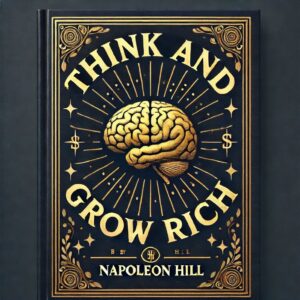The Power of Grit: A Deep Dive into Angela Duckworth’s “Grit: The Power of Passion and Perseverance”

In a world where success is often associated with talent, intelligence, or luck, Angela Duckworth’s groundbreaking book, “Grit: The Power of Passion and Perseverance,” offers an entirely different perspective. Duckworth, a psychologist and researcher, argues that the secret to success is not innate talent or sudden strokes of genius, but rather a combination of passion and perseverance—what she calls “grit.” Through her research and personal insights, Duckworth emphasizes that grit is the true predictor of achievement, and it can be cultivated in anyone. This article explores the core ideas in Grit and how they can be applied to achieve long-term success.
What is Grit?
At the heart of Duckworth’s book lies the concept of grit, which she defines as a combination of passion and perseverance for long-term goals. Unlike fleeting motivation or momentary bursts of enthusiasm, grit is a sustained commitment to a cause, regardless of challenges, obstacles, or slow progress. Grit isn’t about short-term success or quick wins; it’s about staying the course over years, even decades, to achieve something meaningful.
Duckworth breaks down the idea of grit into two essential components:
- Passion: The deep and enduring interest in a particular goal or field. Passion fuels a person’s drive to keep going, even when progress is slow, or when they encounter setbacks.
- Perseverance: The ability to persist in the face of adversity. Perseverance means that even when the road is tough, the goal is clear enough to keep moving forward.
Together, passion and perseverance combine to form the foundation of grit. It is not simply about working hard, but about working hard for something that truly matters to you, over a long period of time.
The Science Behind Grit
One of the most compelling aspects of Grit is Duckworth’s explanation of the science behind this concept. She draws on years of research in psychology, education, and neuroscience to support her argument. Duckworth’s studies, particularly her work with students, teachers, and corporate leaders, show that grit is a better predictor of success than talent alone.
In one of the most famous studies she conducted, Duckworth worked with West Point Military Academy cadets. She found that grit, measured by how persistent cadets were in the face of difficulty, was a better predictor of success in their grueling training than raw intelligence or physical ability. Similarly, her research with salespeople and students showed that the ability to stick with a challenge over the long haul is far more important than having initial talent.
Duckworth’s insights are supported by research in the field of neuroscience. Studies have shown that the brain’s reward system is activated when we experience progress, even if it is slow. This reinforces the behavior, creating a feedback loop that encourages perseverance. Furthermore, grit helps us develop resilience—the ability to bounce back from failure, learn from mistakes, and keep going despite setbacks.
Grit in Action: Real-World Examples
Throughout Grit, Duckworth shares a range of real-world examples of individuals who exemplify grit. From high school students to professional athletes, these stories demonstrate the power of persistence and passion. One of the most powerful examples comes from the world of education, where Duckworth worked with students from diverse backgrounds.
She notes that while students from wealthier backgrounds may have access to better resources and opportunities, those from disadvantaged backgrounds can still succeed if they possess grit. She tells the story of a group of students from low-income families who were part of a program to help them achieve academic success. The students’ ability to stay focused and work hard in the face of adversity was a key factor in their success, regardless of the challenges they faced outside of school.
In another example, Duckworth explores the story of an accomplished artist who spent decades honing her craft. This artist, like many others, was not necessarily the most naturally gifted, but her unrelenting pursuit of improvement over time, despite initial failures, eventually led to mastery. These stories highlight the importance of grit over raw talent and underscore Duckworth’s central thesis: that talent can be developed through sustained effort and perseverance.
The Grit Scale: Measuring Perseverance
One of the most innovative contributions of Grit is the development of the “Grit Scale.” This is a self-assessment tool that measures an individual’s level of grit. The Grit Scale consists of questions that ask individuals to reflect on their perseverance and passion for long-term goals. Through this scale, Duckworth aims to provide a way to measure grit objectively and assess its correlation with success in various fields.
The scale has been used in a variety of contexts—from educational settings to business and sports—to identify individuals with high levels of grit. Duckworth believes that by understanding and measuring grit, people can become more self-aware of their ability to persevere, and can then take steps to develop it further.
How to Cultivate Grit
While grit is often seen as a trait that some people are simply born with, Duckworth insists that it is something anyone can cultivate. She outlines several strategies for developing grit in both individuals and organizations:
- Set Long-Term Goals: People with grit tend to have a clear, overarching goal that they are passionate about. By identifying a long-term goal that truly matters to you, you create a sense of purpose that drives your persistence.
- Practice Deliberately: Gritty individuals understand that success comes not just from hard work, but from practicing with the intention of improving. Deliberate practice focuses on improving weaknesses, pushing the boundaries of what’s possible, and continuously striving for mastery.
- Embrace Challenges: People with grit don’t shy away from difficulties. They see challenges as opportunities for growth and understand that failure is not a permanent state, but a necessary step toward improvement.
- Stay Consistent: Success doesn’t come from sporadic bursts of effort. It’s the daily grind and the consistent application of effort toward a goal that makes all the difference in the long run.
- Build Resilience: Gritty individuals bounce back from setbacks quickly. By developing resilience, individuals can maintain their motivation, learn from mistakes, and keep moving forward.
Conclusion: The Grit Mindset
In Grit: The Power of Passion and Perseverance, Angela Duckworth presents a powerful argument for the value of perseverance in achieving long-term success. Her research shows that grit—defined as passion and perseverance for long-term goals—is a better predictor of success than talent, intelligence, or luck.
Duckworth’s work encourages individuals to cultivate their own grit by setting meaningful goals, practicing deliberately, embracing challenges, and staying committed over the long haul. As we face increasing challenges in our personal and professional lives, Grit reminds us that success is not a product of talent alone, but the product of continuous effort, resilience, and determination.








